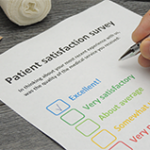5. Consider generics—maybe. Generic costs are worth an inquiry, but they may not always be a viable option. Generic medications have saved patients money in the past, but that isn’t always the case anymore. “Paradoxically, some patients may pay more for relatively inexpensive generic small-molecule drugs like methotrexate, leflunomide or hydroxycholoroquine compared with more expensive biologics that offer copayment assistance,” Dr. Worthing says.
6. Encourage patients to ask pharmacies about better prices. “About 10 or 20% of the time our patients fill a prescription, they can save money by paying cash instead of paying a copay, because of the formulary arrangements made by pharmacy benefit managers (PBMs),” Dr. Worthing says. “The pharmacist is often ‘gagged’ [by law or agreements] from telling people this.” He advises rheumatologists advise patients to specifically ask if they can save by filling a prescription without using insurance and possibly with a GoodRx coupon instead.
Pharmacists will be empowered to inform people about these issues if the gag rule is lifted by active bills under consideration in Congress, Dr. Worthing says. At its May legislative fly-in event, the ACR supported the lifting of this gag rule, he adds.
7. Preach better lifestyle choices. Rheumatologists know that biologics are needed for chronic, incurable diseases they treat, such as RA, Dr. Worthing says. That said, healthier choices can make a positive difference for certain conditions.
“We go through sleep, exercise, diet, alcohol and tobacco every time I meet with a patient. These interventions can be just as important, and we can’t belittle that,” Dr. Greer says. He adds, for someone with gout, “dietary indiscretions” can exacerbate the disease, so better diet choices can help.
When medications are prescribed on the basis of weight, weight loss could potentially reduce the amount of medicine given and help lower costs slightly, Dr. Gibofsky says.
8. Speak up. Dr. Worthing plays an active role with the ACR in studying drug cost issues and shares his perspective on getting involved with drug pricing on the legislative side. “Rheumatologists can learn more and send a message to their elected officials at the ACR’s legislative action center. The Trump administration is currently considering several new policies to try to lower drug prices. Some might improve patients’ access to treatment—like ensuring that pharmacy benefit manager rebates are passed on to patients—but the ACR is very concerned about such proposals as increasing utilization management in Medicare or requiring doctors to participate in demonstration projects that limit use of medically necessary treatments.”



